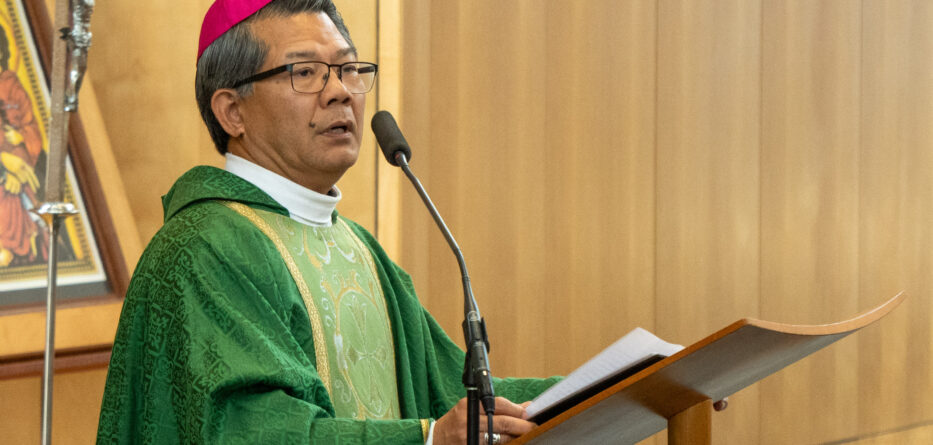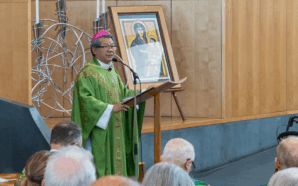Most Reverend Vincent Long Van Nguyen OFM Conv DD STL, Bishop of Parramatta
Homily for the 13th Sunday in Ordinary Time, Year B
Readings: Wis 1:13-2:23-24; 2Corinthians 8:7,13-15; Gospel, Mark 5:21-43
30 June 2024
Enabling outsiders to be stakeholders in new social possibilities
Dear brothers and sisters,
We are about to enter the first week of July, which is known as NAIDOC week. As people of the Gospel, we remain committed to the task of closing the gap, healing the wounds, addressing systemic disadvantage and strengthening our relationship with our First Nations brothers and sisters. We are guided by the example of Jesus who untiringly sought out the sick, the poor, the vulnerable and the excluded in his messianic ministry among us.
The Word of God today reminds us that the Christian story is fundamentally about divine inclusion conquering human exclusions. It is about bringing people into the fullness of God’s shalom, rather than shutting them out in a zero-sum game. In Jesus, God calls us to bring outsiders into the circle of equal dignity, love and human flourishing. We are inspired by his word and example to enable strangers and outcasts to be stakeholders in new social possibilities. This is essentially the best of the Judeo-Christian heritage. It is the distinguishing mark of the early Jesus movement. It is the Church’s human enterprise.
In the first reading from the Book of Wisdom, we hear that it is God’s intent to make life viable for all. The Book of Wisdom was written at a time when belief in the resurrection was emerging in Israel. God was not powerless against death. He would overcome Hades, which was believed to be the dwelling place of the dead. The Book of Wisdom echoes the words of Jesus who came to give the fulness of life for all.
Last week, we heard how he took his disciples in a boat and went to the other side of the lake. It was a symbolic act of leaving one’s comfort zone and expanding one’s horizons. The Gospel today speaks about the way God interacts with the forgotten and the maligned among us. Through the person and ministry of Jesus, God does not turn a blind eye to the plight of the sick, the poor and the afflicted. In him, he attends not only to their physical needs of food, health and wholeness. He also raises them up at the deepest level of their humanity. To follow Jesus is to live for others.
The Gospel tells the story of Jesus who performs two healing miracles on two females. He goes with the crowd to Jairus’ house to attend to his sick daughter when he is ‘ambushed’ by a woman with hemorrhage. We are told that the woman had suffered this humiliating illness for 12 years and the doctors had failed to help her recover. She works her way through the crowd and approaches Jesus silently, stealthily and fearfully. She touches him believing that she would be healed, and she was. But the story does not end there. Jesus could have walked on without embarrassing the woman and without confronting assumptions and attitudes, which give rise to her exclusion.
This is the prophetic trademark of Jesus. He doesn’t just heal physical wounds and illnesses. He forces us to confront the issues that can’t be named. The woman was already healed after touching his clothes. Jesus could have walked on to the house of Jairus. But no, he stops and asks the woman to come out and share her story publicly. He puts the victim and the issue at the centre, just as he did with the blind beggar and the woman caught in adultery. He compels his audience to ask questions like why is women’s menstruation considered impure? Why do religious laws and social customs circumscribe our behaviour towards men and women differently? Why do certain things in women’s biology render them less equal than men in society? He thus disrupts entrenched stereotypes and biases. He subverts our assumptions. A dangerous prophet indeed!
He then shows how he himself treats the woman with stigma. Jesus affirms her dignity and her faith with the words “Daughter, your faith has saved you!” In doing so, Jesus gives her something that is no less important than her health, namely her visibility, voice and status. If number 12 is a symbol of the new kingdom (see 12 gates in Revelation 21), then his healing of both the woman with 12 years of bleeding and the 12 year old girl may be a sign that the old world where women are treated with invisibility, silence and inferiority has come to an end. Jesus has inaugurated a new world of equal citizenship. The Church has to reclaim this vision of a faith community where the less privileged are accorded full visibility, voice and status. This is the kind of Church that images Christ.
Indeed, when we survey the many encounters of Jesus with the outsiders, we recognise a pattern of behaviour that subverts the status quo. It tells us that Jesus reveals a God who dignifies the oppressed, lifts up the downtrodden and empowers them to be the stakeholders of the new heaven and the new earth.
In the light of the Scripture today, we pledge to create an environment where fear of differences is replaced by encouraging all people to share their gifts. The world often pushes us to compete or conform, but God calls us to a different way: working together, needing each other, being the body of Christ. We commit ourselves to walk as pilgrims open to be formed and enriched by the journey. May we in all the upheaval and chaos around us learn to act justly, love tenderly and walk humbly with the God who works with us towards a new heaven and earth.








